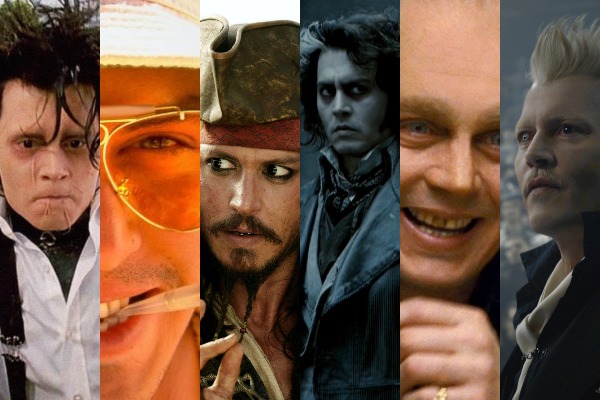“People say I make strange choices, but they’re not strange for me. My sickness is that I’m fascinated by human behavior, by what’s underneath the surface, by the worlds inside people.” – John Christopher Depp II
Where and when did Johnny Depp say that? No idea. The above utterance is the kind of thing you find passed around Pinterest or the infinite number of inspirational quotation websites online, irrevocably tethered to the name succeeding it. At this point, “the worlds inside people” almost seems self-referential. After a string of flops, blowing his fortune, an extremely public divorce riddled with claims of abuse, we ponder Depp’s world. The one inhabited by personalities like Edward Scissorhands, Raoul Duke, Jack Sparrow, Willy Wonka, Sweeney Todd, James “Whitey” Bulger, and Gellert Grindelwald—the latter of which left the building after a British judge called the allegations that Depp’s a wife-beater “substantially true.”
Depp was once the sensitive bad boy who could’ve been a leading man but instead chose to become a quirky character actor, completely in control of his creative decisions. Now, it’s as if those multiple personalities forgot their conception, resulting in parodies of themselves (or just one gimmick?). We look at the history of Depp’s career—comprised of indie cult classics, pirates treasure, and failed reboots, smeared on the makeup of a thousand personalities.
Photo: Twentieth Century Fox/Universal Pictures/Walt Disney Pictures/Paramount Pictures/Warner Bros.
Diminishing returns: Johnny Depp Fans to Boycott ‘Fantastic Beasts 3,’ Joins the Rest of Us Who Just Wish They’d Stop Making Them
What not to do: The Johnny Depp-Amber Heard Dating Guide to Ending Your Relationship Amicably
Visit the Mandatory Shop for great deals on your very own Mandatory merch.
Follow Mandatory on Facebook, Twitter, and Instagram.
The Multiple Personalities of Johnny Depp
-
Midnight. Baseball bats and boogeymen. Beautiful.
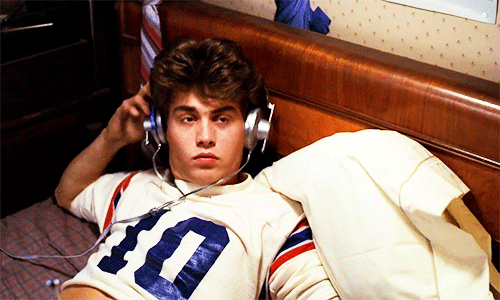
Johnny Depp dropped out of high school at 16 years old. He and his band The Kids set off for Los Angeles in the early '80s—the sort of move you hear about but so few of us dare to do. The band enjoyed modest success until Depp met the illustrious actor, Nicolas Cage. Despite Depp’s rock-star ambitions, Cage told him, “I think you can act.”
Following that conversation, Depp auditioned for Wes Craven’s 1984 horror classic, A Nightmare on Elm Street. Supposedly, Craven’s 13-year-old daughter saw Depp’s headshot and thought he was a dreamboat. So, Depp played crop-top-wearing Glen Lantz, the jock boyfriend of heroine Nancy Thompson (up until Freddy Krueger liquefied him).
-
Without Jenko we're gonna be Charlie's Angels.

Depp’s cookie-cutter role in A Nightmare on Elm Street led to an audition for Fox’s police procedural, 21 Jump Street (tagline: crime in school is bad, so combat it). “It was a last-minute thing,” said Depp. “I had one of the worst flus that I’ve ever experienced in my life, and I was forced to go to the audition, the screen test.” Thankfully, nauseous with a hint of delirium describes your typical teenager.
Depp won the role of the youthful-looking undercover police officer, Tom Hanson, and became a teen idol. However, it was a far cry from the roles that would define Depp’s career. He rebelled against the pretty-boy image, even telling the directors of Jump Street that he wanted to be fired. His next role in John Waters’ Cry Baby gave the finger to his heartthrob image, opening the door to bigger (and sharper) things.
-
I am not complete.
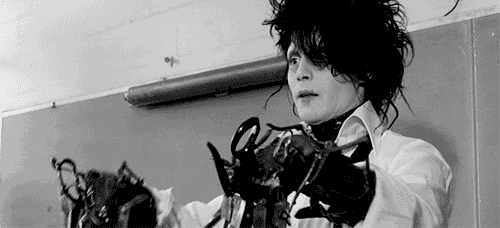
Without creative ambition, you might as well be three (highly-sexualized) women working for a private detective agency. Depp officially stopped being a “product” in Tim Burton’s Edward Scissorhands (1990), a part he won over big names like Tom Cruise. It earned him his first Golden Globe nomination. The gothic fairy tale (as well as Depp’s titular performance) was as off-the-beaten-path as one could imagine, simultaneously paving the way for Depp’s future. He and his onscreen love interest, Winona Ryder, became tabloid crack, resulting in Depp’s much-talked-about tattoo, "Winona Forever," which has since (appropriately) been corrected to "Wino Forever."
-
Put on some golf shoes! Otherwise we'll never make it out of this place alive.
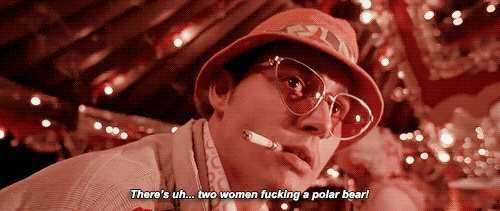
As you know, Edward Scissorhands was the first of the Depp-Burton collaborations, one Depp followed up with acclaimed/eccentric performances in Arizona Dream (1992), Benny and Joon (1993), and What’s Eating Gilbert Grape (1993) before reuniting with Burton in 1994’s Ed Wood. Depp’s performance as a clueless director earned him yet another Golden Globe nomination (on top of Benny and Joon), catapulting him to star status alongside legends like Marlon Brando (Don Juan DeMarco), Al Pacino (Donnie Brasco), and even playing a version of his friend, the infamous father of gonzo journalism, Hunter S. Thompson in Fear and Loathing in Las Vegas (1998). In 1998, while filming The Ninth Gate in Paris, Depp met the would-be mother of his two children, Vanessa Paradis.
"She was wearing a dress with an exposed back and I saw that back and that neck, and then she turned around and I saw those eyes, and — boom!" said Depp. "My life as a single man was done."
-
I stand up for sense and justice.

By the time Depp reunited with Burton for the third time in Sleepy Hollow (1999), it became clear to everyone that the actor was choosing roles he found interesting rather than profitable. Depp was officially the sensitive, mysterious loner—a bad boy turned good with an affinity for quirky and misunderstood characters. He climbed Hollywood’s superficial and restrictive ladder without succumbing to any of its ceremonial trappings. If Depp’s story of a kid moving from Kentucky to Los Angeles is the American dream, then the American dream is a confusing, capricious, yet sympathetic mess. For this, he was (and perhaps always will be) beloved.
-
Not all treasure is silver and gold, mate.

At the height of indie-era Deppism, he was the wanna-be rocker who didn’t even necessarily want to act but was better at it than his contemporaries, a man of unapologetic swagger and charm, idolizing hellraisers like Thompson and The Rolling Stones guitarist Keith Richards. Then, the House of Mouse decided they wanted him to make a movie based on a theme-park ride, and the indie-era ended.
Depp’s turn as Captain Jack Sparrow in Disney’s Pirates of the Caribbean: The Curse of the Black Pearl (2003) sent his career into the stratosphere. The stories of how he modeled his performance off of Richards and cartoon skunk Pepe Le Pew has become legendary—consistently ignoring the whines of studio executives after watching dailies. Is he drunk? Is he gay? What in the fuck is he doing? Not only was Depp a hit with audiences but earned his first Academy Award nomination that year. He would go on to star in all four sequels and become one of the highest-earning stars for over a decade.
-
Making 'stupid money.'

The critical and commercial success continued in the years that followed: 2004’s Finding Neverland (second Oscar nomination), playing Willy Wonka in Tim Burton’s Charlie and the Chocolate Factory (Golden Globe nomination), and Sweeney Todd: The Demon Barber of Fleet Street (third Oscar nomination). After helping to portray the late Heath Ledger’s character in Terry Gilliam’s The Imaginarium of Doctor Parnassus, Depp went on to star in Michael Mann’s Public Enemies as John Dillinger (2009). The actor commanded over $20 million (average) upfront per movie; making around $300 million off the Pirates of the Caribbean franchise (overall)—which he has described as “stupid money” used to buy private islands, yachts, and a wardrobe worthy of the Mad Hatter.
-
Have I gone mad?

After reuniting (again) with Burton to play the Mad Hatter in Alice in Wonderland (2010), things started to become a tad too consistent. Depp’s performance as the Mad Hatter was the first Burton outing that felt like an amalgamation of everything he’d already done. While he made $55 million in backend earnings off Alice in Wonderland, those films certainly weren’t his best-received; Hatter and Sparrow laughed their way to the bank regardless.
The fourth installment in the Pirates series, On Stranger Tides (2011) was the worst received in the franchise (despite being a box office success), Rango (2011) was OK, but the adaptation of Hunter S. Thompson’s The Rum Diary lacked the allure of Fear and Loathing Las Vegas. It was on The Rum Diary (2011) that Depp met Amber Heard.
-
If the drinking doesn't get you into trouble, the women definitely will.

Seemingly right when Depp’s critical prowess began to wither, in 2012, he and his long-time partner (of 14 years) Paradis broke up. The fairy-tale was over. Enter Heard. Presumably the two starting dating almost immediately. Although Depp did not know it, his life as a single man was about to begin again in a big way.
Depp married Heard in 2015. 15 months later, Heard (or one of her friends) allegedly defecated in their marital bed, ending the relationship. As their nasty divorce raged on, Depp faced more than just claims of physical and verbal abuse from Heard; his recreational drug and alcohol use is said to have become self-destructive (both during and after the marriage). In 2018, Depp said that his $650 million fortune was gone thanks to shitty lawyers (they said he just spent it all).
-
They tried stoning me, my dear. It did not work.

Burton’s Dark Shadows (2012) flopped—Depp’s accents, hairdos, and mannerisms seemed to become a schtick, its retrospective brilliance fading with each Burton remake. It began to feel like Depp was phoning it in. His cameo in 21 Jump Street (2012) was funny but did little for his career. The Longer Ranger was ridiculous, losing Disney $190 million and ending producer Jerry Bruckheimer’s winning streak. We forget Depp was even Into the Woods but let’s not forget about Transcendence (2014)…
-
If nobody sees it, it didn't happen.
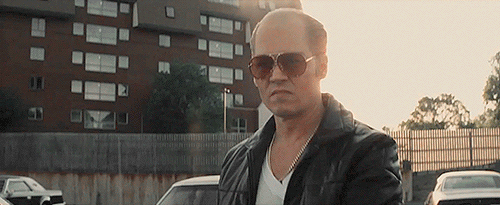
Depp portrayed Boston crime boss Whitey Bulger in Scott Cooper’s Black Mass (2015). Ditching his young looks and derivative tendencies for a ruthless performance. In 2016, Depp played Donald Trump in Funny or Die’s Donald Trump’s The Art of the Deal: The Movie, and people thought maybe he’d make a comeback. Unfortunately, he made a lackluster return as the Mad Hatter in Alice Through the Looking Glass (2016) and was secretly cast as Gellert Grindelwald in the Fantastic Beasts and Where To Find Them (2016).
-
Will we die just a little?
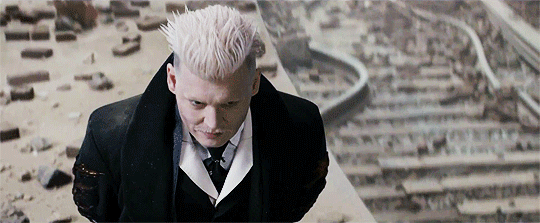
What does that mean? Many fans of the Wizarding World found Depp’s appearance in Fantastic Beasts distracting and Warner Bros. was criticized for casting Depp amid abuse allegations. However, David Yates and writer J.K Rowling defended Depp. Aside from his final appearance as Sparrow in Pirates of the Caribbean: Dead Men Tell No Tales, his follow-up roles were less-than-notable: Murder on the Orient Express (2017), Sherlock Gnomes (2018), and The Professor (2018). In 2018, he starred in Fantastic Beasts: The Crimes of Grindelwald, and Heard penned a piece for The Washington Post in which she opened up about being a victim of domestic abuse (without naming Depp directly). This is what prompted the British paper, The Sun, to call Depp a “wife-beater.”
Depp filed a $50 million civil suit against Heard for her editorial and a civil suit against The Sun for their reporting as well as a defamation lawsuit against Heard for writing the op-ed. In 2020, UK Judge Andrew Nicol found the burden of proof had been satisfied for 12 of the 14 allegations The Sun reported on. Depp lost the suit. Following the civil case against The Sun, Warner Bros. asked Depp to resign from the Fantastic Beasts franchise. Depp’s defamation suit against Heard is still in play.
-
Johnny Depp's Career (1984-2020)
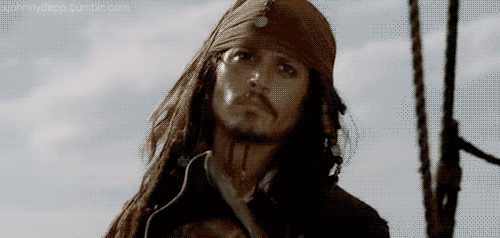
On approximately Monday, Nov. 2, 2020, Johnny Depp’s career, 36, met its demise in London's High Court. The investigation of the incident is ongoing. According to various bodyguards, witnesses, bartenders, drug dealers, and one very-disgruntled ex, a whirlwind of reckless decisions has left the actor’s reputation in disarray. It was previously seen procuring a valiant performance in 2020’s Minamata and attempting a starring role in the Houdini TV series— the recent libel ruling has made this casting untenable (and Disney has blocked Depp’s return to the Pirates franchise).
The dying wish of Depp’s career, to be cannon-balled into the sky (similar to what Depp arranged for Hunter S. Thompson), is still pending. Resurrection isn’t impossible. While Depp might not be in any major blockbuster for a time, fan support for him is overwhelming—petitions and Twitter campaigns, oh my. Also, Depp's defamation suit against Heard is still in play. Recordings incriminating Heard (as the abuser), as well as general confusion, bias, a multitude of personalities, and manipulative PR teams have made an exhausted public ambivalent. Like the utterance mentioned at the beginning of this article, the truth has been passed around so many times, we don’t even know from whence it came. If Depp’s career has come to a close, we raise a bottle of rum to that which has inspired and entertained so many. “Drink up me hearties, yo ho...”
